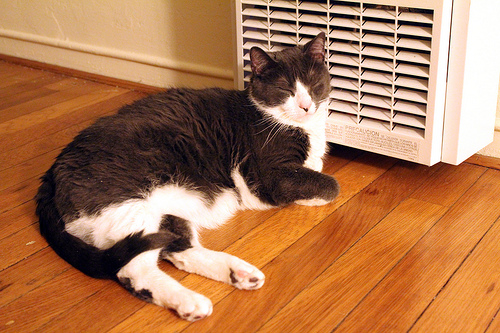
Now that Beijing has begun to turn cold, there area few considerations that we should keep in mind to ensure the good health of our beloved pet family members.
The first consideration is tolerance for changes in temperature, which is age related. If your pet is older (over ten-years of age) then he or she should be protected against very cold weather. This is because their bodies cannot adjust as well to changes in the environment and if they are out too long in temperatures colder than their own body temperature (100 – 102 degree Fahrenheit or 39 degree Celsius), their own body’s internal “thermostat” may not be capable of keeping them sufficiently warm. To provide some protection for your pets, jackets, coats, raincoats, and all manner of clothing are now available for your pet. This would be especially helpful for shorthaired dog breeds. Leaving your dog or cat alone for long periods in the car in cold weather would be the same as leaving them outdoors, especially if it’s very cold. The car can act as a refrigerator and in some instances they could even freeze to death.
In the winter, anti-freeze is often a necessity for our cars, but even a little bit of this liquid is toxic and often fatal to dogs and cats. They need only lick some off of their paws to get sick. Anti-freeze acts very quickly to destroy the kidneys so please keep these products properly stored and away from your pets. It is a good habit to wipe down your dog’s paws when coming in from an outdoor walk as this helps to remove traces of anti-freeze as well as keeping their paws clean.

Cats should not be left outdoors, for many of the same reasons that apply to dogs. In addition, cats will often crawl under the hood of a car to keep warm especially if the car has just been driven. When you get back into your car you might prevent a possible accident by pounding on the hood of the car to scare out any cats as they often get caught in the fan belt and other moving parts of the car if they’re trapped under the hood.
During snow days, sprinkling salt on roads is becoming popular to keep the streets from becoming too icy. Salt can be irritating to your dog and they may also lick their paws and ingest the salt, causing indigestion. There are shoes and boots available for dogs, if appropriate, but rinsing his/her paws off after an outdoor walk can avoid any irritation from the salt.
Puppies are similar to older aged dogs in that they are also less able to control their body temperature in cold weather. They should be well protected against the weather when taken outdoors, and attention should be given to their tolerance level (e.g., shivering, lack of activity, etc.). Puppies should be brought indoors immediately if they cannot handle the outdoor temperatures.
During the dry, cold winters in North China, it may be better to reduce the frequency of bathing your dog or cat to no more than once every six-weeks. Frequent bathing may exacerbate dry skin and cause skin irritations. If needed, use a warm, damp cloth to wipe down the hair coats of your dog and cat in between baths.
Lastly, nutritional needs for your pet in cold weather are very important. A dog or cat that is outdoors in very cold weather for longer periods of time will require more calories to keep warm and additional protein in his/her diet would be recommended. Dogs can and do spend a lot of time outdoors in cold weather, especially certain breeds that live in the northern hemisphere. These breeds will naturally develop a very thick hair coat for the winter and this acts as a natural insulation for them (e.g., Siberian Husky, Alaskan Malamute, etc.).
About the Author
Dr. Yang Wei Wei is the medical director at the International Center for Veterinary Services (ICVS)
Please contact ICVS for more information on caring for pets, the pet adoption program, and other services:
Tel: (010) 8456-1939/1940
Email: ICVS_CHINA@yahoo.com
Photos: Tobyotter, quinn.anya (flickr)



